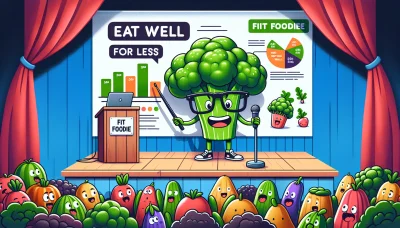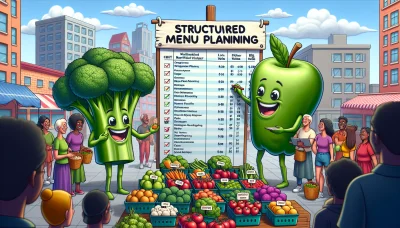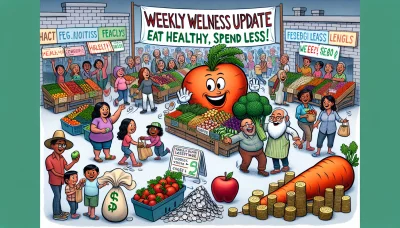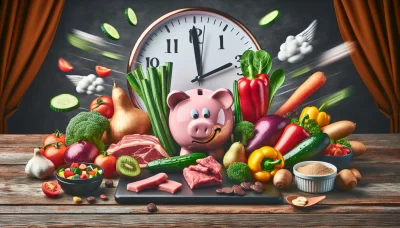Weekly Health and Fitness Insights Quiz
Test Your Knowledge
Question of
Weekly Health and Fitness Insights: Your Guide to Healthy Eating
Integrating healthy eating habits into our weekly routines is crucial for improving overall health and fitness. A balanced diet not only fuels our bodies with the necessary nutrients to function optimally but also plays a significant role in preventing chronic diseases, maintaining a healthy weight, and enhancing our mental health. By making conscious food choices and planning our meals, we can ensure that we are consuming a variety of nutrients essential for our well-being. Embracing healthy eating as a lifestyle choice can lead to long-term benefits, including increased energy levels, improved immune system, and a better quality of life.
The Basics of a Balanced Diet
A balanced diet is essential for maintaining good health and well-being. It involves consuming a variety of foods in the right proportions to provide the body with all the nutrients it needs to function correctly. The fundamental principles of a balanced diet include the importance of both macronutrients—carbohydrates, proteins, and fats—and micronutrients, such as vitamins and minerals. Carbohydrates are the body's primary energy source, proteins are crucial for growth and repair, and fats provide essential fatty acids and help absorb vitamins. Micronutrients, though needed in smaller amounts, are vital for various bodily functions, including bone health, immune function, and blood clotting. Ensuring a diverse intake of foods can help achieve a balanced diet, supporting overall health and preventing various diseases.
Top 5 Superfoods to Include in Your Weekly Diet
- Blueberries: Packed with antioxidants and phytoflavinoids, blueberries are also high in potassium and vitamin C, making them the top choice for preventing disease and keeping your mind sharp. Simple inclusion: Add them to your morning oatmeal or yogurt.
- Spinach: This leafy green is rich in iron, magnesium, and vitamins A, C, and E, which are essential for skin health and immune function. Simple inclusion: Toss it into salads or smoothies for a nutrient boost.
- Salmon: A great source of omega-3 fatty acids, which are important for brain health and reducing inflammation. Simple inclusion: Grill or bake it for a quick dinner, or add it to salads for lunch.
- Quinoa: With all nine essential amino acids, quinoa is a complete protein source. It's also rich in fiber, magnesium, B vitamins, iron, potassium, calcium, phosphorus, vitamin E, and various beneficial antioxidants. Simple inclusion: Use it as a base for salads or as a side instead of rice.
- Almonds: High in healthy monounsaturated fats, fiber, protein, and various important nutrients. Almonds can lower blood sugar levels, reduce blood pressure, and lower cholesterol levels. Simple inclusion: Snack on a handful, or chop and sprinkle them over salads, yogurt, or oatmeal.
Understanding Calories and Portion Sizes
Managing calorie intake is crucial for maintaining a healthy diet and achieving weight management goals. Calories are a measure of the energy that food provides to our body. Consuming more calories than the body needs can lead to weight gain, while consuming fewer calories than required can lead to weight loss. Therefore, understanding the calorie content of foods and controlling portion sizes is essential. Portion control helps in moderating the amount of food consumed and ensures a balanced intake of nutrients without overeating. By paying attention to portion sizes and making informed choices about the calories in foods, individuals can maintain a balanced diet and support their overall health and well-being.
Weekly Meal Planning Tips
- Start by reviewing your weekly schedule to determine how many meals you need to plan for.
- Check your pantry, fridge, and freezer to see what ingredients you already have.
- Choose recipes that are both healthy and enjoyable. Consider including a variety of proteins, vegetables, and whole grains.
- Make a grocery list based on the recipes you've chosen to avoid buying unnecessary items.
- Prep ingredients in advance. Washing, chopping, and storing vegetables and meats can save a lot of time during the week.
- Incorporate leftovers into your meal plan. Cook once, eat twice to save time and reduce waste.
- Be flexible with your plan. It's okay to swap meals around based on how your week is going.
- Consider theme nights to make planning easier, like Meatless Monday or Taco Tuesday.
- Use a meal planning app or a simple spreadsheet to organize your meals and grocery lists.
- Involve your family in the planning process. It can help ensure that the meals meet everyone's taste preferences and dietary needs.
The Role of Hydration in Fitness
Staying hydrated is a cornerstone of maintaining overall health and optimizing fitness performance. Water plays a crucial role in regulating body temperature, lubricating joints, and transporting nutrients to give you energy and keep you healthy. When you're well-hydrated, you can perform at your best, with increased stamina and reduced risk of cramps and injuries. To ensure adequate water intake throughout the day, start by drinking a glass of water first thing in the morning to kickstart your hydration. Carry a reusable water bottle with you and sip from it regularly, aiming for at least 8 glasses of water a day, or more if you're active or live in a hot climate. Pay attention to your body's cues; thirst is an obvious sign of dehydration, but fatigue and dry lips are also indicators. Finally, eating foods with high water content, like fruits and vegetables, can also help keep you hydrated. By making hydration a priority, you'll support your fitness goals and overall well-being.
Staying Motivated on Your Health Journey
Maintaining motivation on your health and fitness journey can sometimes feel like an uphill battle. One key strategy is setting realistic expectations. It's important to acknowledge that progress takes time and that setting achievable goals can prevent feelings of frustration and defeat. Celebrating small victories is equally important. Recognizing and rewarding yourself for reaching a milestone, no matter how small, can significantly boost your motivation. These milestones can be anything from sticking to your workout schedule for a week, making healthier food choices, or even just feeling more energetic. Remember, every step forward is a step in the right direction.












